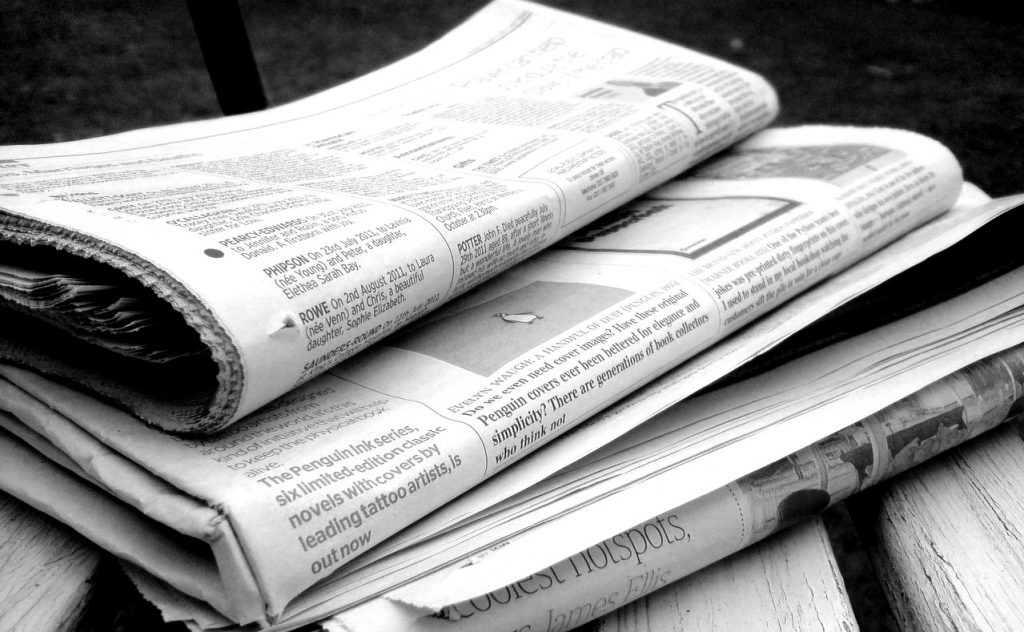Bipartisan Bill Protects Student Newspapers
Bill would bar college or high school administrators from pulling articles.

Newspapers. Photo by flickr user Jon S. (CC BY 2.0)
Student newspapers in Wisconsin would be protected from interference by college or high school administrators under a new, bipartisan bill that would guarantee free speech protections for student journalists in state law.
If backers are successful, Wisconsin would be the 18th state to address a 1988 U.S. Supreme Court ruling allowing administrative review of school-sponsored news stories.
Freedom of speech and of the press are enshrined in the U.S. Constitution’s First Amendment, but when it comes to student-run newspapers funded by high schools, there’s a caveat.
In a 1988 ruling known as Hazelwood v. Kuhlmeier, the U.S. Supreme Court held that a principal in Missouri did not violate students’ free speech rights by pulling articles they wrote about teen pregnancy and the impact of divorce prior to the school newspaper’s publication. Because the paper was sponsored by the school, the court said, the principal was right to prevent articles deemed inappropriate.
A bipartisan group of lawmakers in Wisconsin hopes to address that ruling by including new free speech and free speech protections for student journalists in state law. Their bill clarifies that student journalists are responsible for content published in student-run newspapers or websites and school administrators will be barred from “exercising prior restraint” over those publications.
The bill would provide protection from disciplinary actions brought by the school against student journalists or their advisors. It would also allow them to sue a school to enforce free speech protections.
The bill would not offer protection to students for articles or opinion pieces considered libelous, obscene or inciting students to violate laws or school policies.
During a public hearing in October, Stoughton High School junior Simon Mehring told lawmakers that with the backdrop of the 1988 Supreme Court precedent, freedom of the student press is now governed by district or school policies. Mehring, who is an editor of the Norse Star at his school, said he’s one of the lucky student journalists whose district policy mirrors language in the bill.
“Unfortunately, hundreds of high school student journalists across our state schools and universities aren’t so lucky,” Mehring said. “Many students aren’t able to cover the most important and relevant topics in their communities due to restrictive prior review and censorship policies.”
Written testimony submitted to lawmakers by high school journalists in places like Peawaukee, Spooner and West Bend claimed school administrators censored articles on topics like sex education or changes to English curriculum.
While most of the discussion on the student free press bill focused on high schools, it would extend the same free speech protections to student newspapers at Universities of Wisconsin campuses and Wisconsin technical colleges.
Joe Cohn, the legislative and policy director for the Foundation for Individual Rights and Expression, told lawmakers a 2005 decision from the Seventh Circuit U.S. Court of Appeals means college administrators are also allowed, by law, to preemptively censor or pull articles. Cohn said Wisconsin and Indiana are the only two states in the nation without free speech protections for student media in statute.
He said the free speech bill before them is based on model legislation that has been adopted by 17 states from the nonpartisan Student Press Law Center, based in Washington D.C.
“And what you’ll notice is that they are not all red states,” Cohn said. “They are not all blue states. They are not all purple states. They fall into all of those categories. And almost all of these bills passed with unanimous support.”
The plan passed the state Assembly on a unanimous 98-0 vote in early November. It has yet to pass the state Senate.
Listen to the WPR report here.
Bipartisan bill would enshrine student newspaper free speech rights in state law was originally published by Wisconsin Public Radio.

















